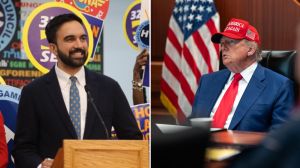This isn’t exactly Sunday reading for Sonia: how to build a New Congress
The outcome of the forthcoming election is not in any doubt. The incumbent coalition will win. The only issue is by how large a margin and w...

The outcome of the forthcoming election is not in any doubt. The incumbent coalition will win. The only issue is by how large a margin and whether the BJP will cross the 200-seat threshold and, if so, by how many. The burning questions of Indian politics are: Will Congress make the triple figure or sink below even the ignominious days of Sitaram Kesri? Indeed, will Congress survive another defeat, and if so, after that defeat what will it do to rebuild itself?
Initial responses to such questions will be denial. Congress, it will be said, will win at the head of the secular— whatever that means — coalition. Sonia Gandhi or some other apparatchik will become PM. All is fine and if you dare say otherwise you are only with the enemy. I know these sentiments.
In the British Labour Party which I joined in 1971 we have been through this experience; been there and got the T-shirt as we say. We suffered four successive defeats and spent 18 years out of power and even then there were comrades reluctant to admit that anything was wrong. They kept on saying ‘‘We only have to educate the people to see that we were the answer. The masses could not possibly vote for the other side.’’
But political parties are either serious about holding office — to serve the public of course — or they are just NGOs. So the painful task of rethinking the past, reviewing the present and rebuilding for the future has to be faced.We did that as we changed leadership three times and changed our philosophy as well as our packaging. New Labour was born out of hard work of Old Labour coming to its senses. Not all of us but enough to make us win two full terms in a row for the first time in our 100-year history.
The first task was to junk excess baggage. Doctrines dearly held by the founding fathers were out of date. Socialism via the capture of State power, control over the Market by the State, building protectionist barriers against imports, taking over the City of London by nationalising banks — all these 1950s dreams had to be abandoned.
We had to understand that the Market had its uses. Indeed, that in our private lives we knew that the Market worked and was indeed better than bureaucracy; that the working classes were just as greedy as the fat cats except that they needed the opportunities to make money. We had to get real and eliminate the distance between rhetoric and private practice.
The next task was to ask ourselves what were our core beliefs. Did we stand for the monuments we had created in the past — nationalised industries, exchange controls, restrictions on banks, interest rate subsidies etc? Or did we stand for equality, for redistribution, decent public services, extension of democracy ? We decided that ends were prior and means could be flexible. ‘‘Traditional values in a modern setting’’ is how John Prescott, the Dy PM and keeper of the flame of Old Labour, describes it.
The third task was to Reform the Party. We had some undemocratic structures such as a block vote for trade unions which allowed leaders to cast millions of votes by just one show of hand.
While unions were the founding organisation of the Labour Party, it made ugly television to see someone vote out some resolution favoured by ordinary members so crassly. We had to reform the way we elected the Leader. This took painful battles among friends before we realised that One Member One Vote was not so bad an idea after all since that was the electoral principle we fought for many years in national politics.
The final task was to modernise our presentation to the people. I recall members who thought that a decently printed leaflet was a betrayal of Socialism since we were using modern technology! We needed to take politics where the people were, to engage with their needs as they saw them and not as our so-called intellectuals told us they should think. This meant rethinking cliches about poverty and about needs of the working class, about the quality of public provision in schools and hospitals, abandoning old beliefs about the causes of criminal behaviour and stopping patronising the poor, the black, and the ethnic minorities. In short, re-educating ourselves in facing up to reality.
Nothing is more painful than admitting that you have been wrong not just in details but in the fundamentals. We did it and Congress will have to do it. For the Congress, it will mean shedding the burden of having been the party that won Independence. That was 57 years ago and for the vast majority of the people, is past history. It also means abandoning the practice of claiming too much for the party and the Dynasty and admitting the contribution of others. It means stopping fighting previous battles which were lost and cannot be restaged — Emergency and Bofors for instance.
But also, one learns to be humble and admitting that others may disagree with what we hold to be basic truths. Learn that democratic behaviour means anyone can be right and everyone has a right to be wrong. While in office, Congress got its intellectuals in positions of power in universities and research councils to rewrite chunks of India’s history. Today the BJP is trying to ape that. It was wrong then; it is wrong now. Someone should say so. Better still stop believing in your own lies or rather lies you have paid to get told.
It will mean restructuring the party and making it democratic. The Party lost its democratic credentials soon after the death of the only genuine democratic leader it had. After Nehru’s death, Lal Bahadur Shastri was chosen leader as required by the rules in the Parliamentary Congress Party. Since Indira Gandhi’s becoming leader, democratic procedure has been forgotten.
Sycophants hang on beseeching a favourable Royal nod and quarrel among each other as to who got the best glance from the Leader. A party aspiring to lead a democratic country has to do better than that even if all other parties misbehave.
But finally, Congress has to ask itself what it stands for. Secularism has come to mean being anti-BJP and little more. All parties play caste and minority politics; all display fake religiosity at festivals. The important thing is that a citizen should not need to display her caste, regional or religious identity to get her grievances heard. She should not be harassed for holding anti-government beliefs or wanting redress against domestic violence or for demanding that the State serve her rather than the officeholders.
Politics has to get out of the public arena which it has corrupted. Can Congress commit itself to restore the country to its people so that they can claim their rights without having to bribe, flatter or kowtow to politicians? Can it serve and I mean really serve the people?
Lord Meghnad Jagdishchandra Desai teaches at the London School of Economics, has served as Opp Spokesperson on Health and Treasury and Economic Affairs



- 01
- 02
- 03
- 04
- 05




























